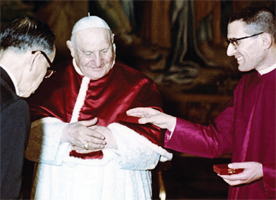Pope Francis has given fresh impetus to interfaith dialogue with the other great monotheistic faiths through his warmth and clarity. In his first year, he has extended the work of Vatican II on relations with Judaism and Islam – but unresolved tensions remain
Jorge Mario Bergoglio, while Cardinal Archbishop of Buenos Aires, built trust and bridges with Muslims and Jews through friendships. Some Catholic conservatives were unhappy; nonetheless he made public visits to a mosque and an Islamic school. Bergoglio allegedly distanced himself from Benedict XVI’s remarks about Islam, made in 2006 at Regensburg, unhappy about language that might “serve to destroy in 20 seconds the careful construction of a relationship with Islam that Pope John Paul II built over the last 20 yea
13 March 2014, The Tablet
Open the doors of the house
Analysis of Francis’ first year: inter-religious discourse
Get Instant Access
Continue Reading
Register for free to read this article in full
Subscribe for unlimited access
From just £30 quarterly
Complete access to all Tablet website content including all premium content.
The full weekly edition in print and digital including our 179 years archive.
PDF version to view on iPad, iPhone or computer.
Already a subscriber? Login





User Comments (1)
The first is Natural Law, which has failed to take account of what we now know about how nature really works. Sexual attraction, along with other human appetites, is a side-effect of evolutionary success. That there should be variations in the nature of sexual attraction should not be a surprise. So how to decide what is "ordered" or "disordered"?
The second foundation I would like to mention, which is perhaps more fundamental than Natural Law is Purpose. What are we here for? The penny catechism provides a perfectly straightforward answer to the basic question. Starting at that point a huge and complex edifice has been constructed over many centuries with the goal of telling us how to live in order to fulfill our Purpose. Subsequent catechisms and (I presume, not being a Canon Lawyer) Canon Law codify the fruits of these efforts.
So if a particular act or behaviour cannot be condemned on grounds of disorder are we free to engage in "moral relativism"? Not at all. Our purpose still demands selfless love, self giving and often self-sacrifice. Virtues, including chastity of course, are still the necessary tools and disciplines we need to strive towards our purpose.
The truth is that any act outside the context of selfless love of neighbour is disordered.